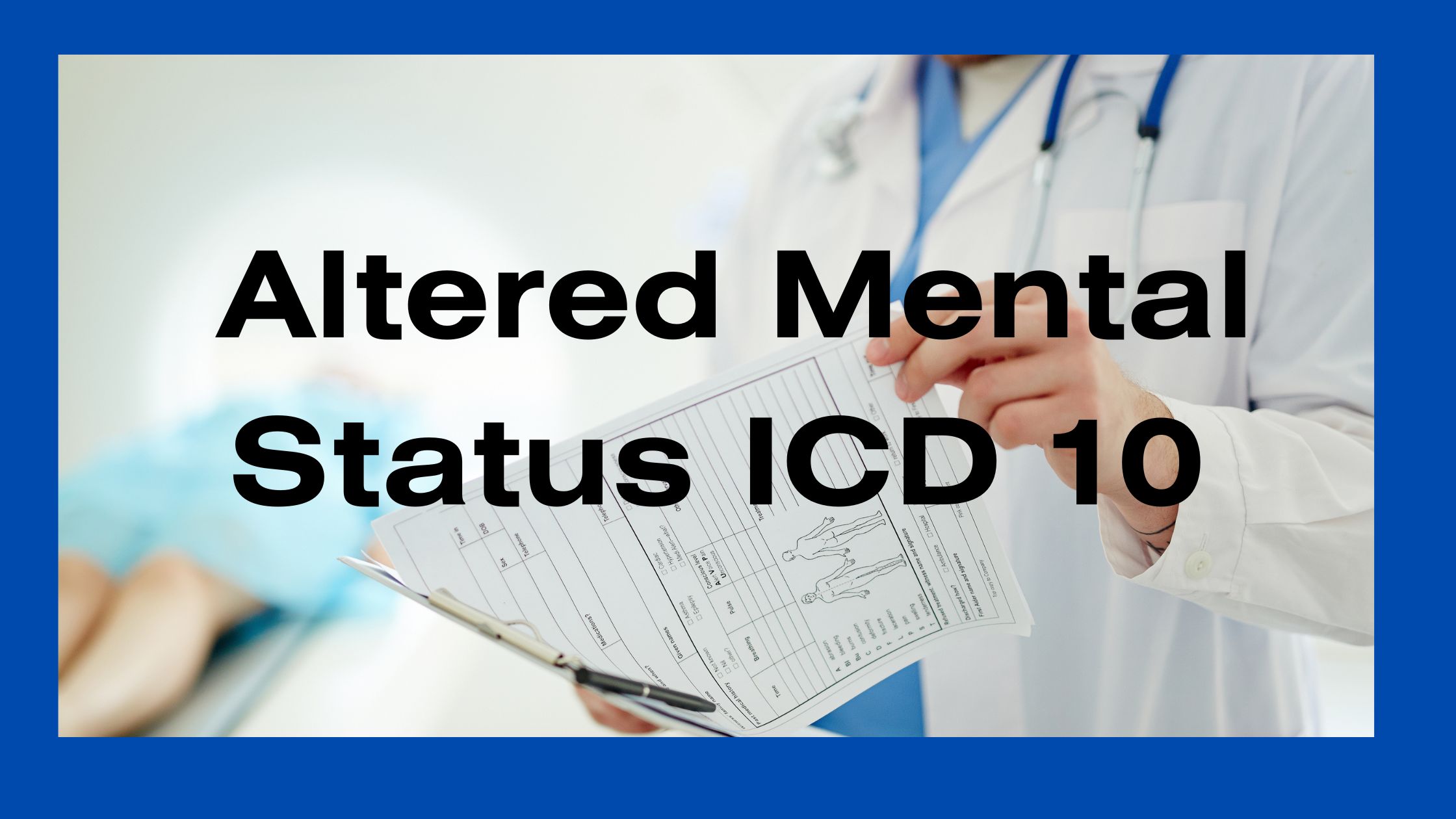Accurate and standardized coding is crucial in the medical field for effective communication of patient information and ensuring proper reimbursement. One widely used code is the ICD-10 code, which stands for the International Classification of Diseases, Tenth Revision. This system categorizes various medical conditions, including altered mental status. In this article, we will delve into the ICD-10 code for altered mental status, specifically focusing on the code R41.82.
Understanding Altered Mental Status:
Altered mental status refers to a condition where an individual’s cognitive abilities and consciousness are impaired or disrupted. It can manifest in various ways, such as confusion, disorientation, memory problems, or unusual behavior. Altered mental status can be caused by a range of factors, including medical conditions, medication side effects, substance abuse, or trauma.
The ICD-10 Code R41.82 for Altered Mental Status:
The ICD-10 code R41.82 specifically pertains to altered mental status. This code falls under the category of Symptoms, signs, and abnormal clinical laboratory findings, not elsewhere classified. It is important to note that R41.82 is a billable code, meaning it can be used for insurance and billing purposes.
- R41.82 – Altered Mental Status, Unspecified:
- This code is used when there is an unspecified alteration in mental status, which can include changes in consciousness or cognitive function without a specific cause identified.
- R40.3 – Persistent Vegetative State:
- This code is used to classify patients who are in a persistent vegetative state. A persistent vegetative state is a condition in which a person appears to be awake but is actually in a state of profound unconsciousness and does not show any meaningful responses to their surroundings.
- R40.4 – Transient Alteration of Awareness:
- This code is used when there is a temporary change in a person’s awareness or consciousness. It can be due to various causes, such as fainting, seizures, or brief episodes of confusion.
- R41 – Other Symptoms and Signs Involving Cognitive Functions and Awareness:
- This is a general code for symptoms and signs related to cognitive functions and awareness when the specific condition is not covered by other codes in this category.
- R41.0 – Disorientation, Unspecified:
- This code is used when a person is disoriented, meaning they are confused about their surroundings, time, or situation. The specific cause of disorientation is not specified.
- R41.1 – Anterograde Amnesia:
- This code is used for cases of anterograde amnesia, which is a condition where a person has difficulty forming new memories after a certain event, often due to brain injury or medical conditions.
- R41.2 – Retrograde Amnesia:
- This code is used when a person experiences retrograde amnesia, which involves the loss of memory for events or information before a certain point in time.
- R41.3 – Other Amnesia:
- This code covers cases of amnesia that do not fit into the categories of anterograde or retrograde amnesia.
- R41.4 – Neurologic Neglect Syndrome:
- This code is used for cases of neurological neglect syndrome, where a person fails to pay attention to or acknowledge one side of their body or environment due to damage in the brain.
- R41.8 – Other Symptoms and Signs Involving Cognitive Functions and Awareness:
- This is another general code for symptoms and signs related to cognitive functions and awareness, similar to R41 but for specific conditions not covered elsewhere.
- R41.81 – Age-Related Cognitive Decline:
- This code is used when there are symptoms related to age-related cognitive decline or mild cognitive impairment.
- R41.83 – Borderline Intellectual Functioning:
- This code is used for cases where a person has intellectual functioning that is below average but not low enough to be considered intellectual disability.
- R41.84 – Other Specified Cognitive Deficit:
- This code is used for cognitive deficits that are not covered by other specific codes in this category. It includes deficits in attention, concentration, communication, visuospatial abilities, psychomotor skills, and frontal lobe/executive functions.
- R41.89 – Other Symptoms and Signs Involving Cognitive Functions and Awareness:
- Similar to R41.8, this code is used for other symptoms and signs involving cognitive functions and awareness when a specific condition is not specified.
- R41.9 – Unspecified Symptoms and Signs Involving Cognitive Functions and Awareness:
- This code is used when the symptoms or signs related to cognitive functions and awareness are not further specified or the underlying cause is unknown.
- R42 – Dizziness and Giddiness:
- This code is used for cases of dizziness and giddiness, which are sensations of unsteadiness or a spinning feeling often related to issues with the inner ear, vestibular system, or other factors affecting balance.
Diagnosing Altered Mental Status:
Diagnosing altered mental status requires a comprehensive evaluation by a healthcare professional. It is crucial to identify the underlying cause to provide appropriate treatment and care to the patient. Various diagnostic tests, review of medical history, physical examination, and cognitive assessments may all be utilized to determine the cause of altered mental status.
Common Causes of Altered Mental Status:
1. Infections: Certain infections, such as urinary tract infections, pneumonia, or meningitis, can lead to altered mental status, especially in older adults. These infections can cause inflammation in the brain or disrupt normal physiological processes, resulting in cognitive impairment.
2. Neurological Disorders: Conditions like Alzheimer’s disease, Parkinson’s disease, or strokes can cause cognitive impairment and altered mental status. These disorders damage brain cells, affecting cognitive abilities and causing changes in mental status.
3. Medications: Some medications, including sedatives, antipsychotics, or opioids, can have side effects that result in altered mental status. These medications may impair cognitive function, leading to confusion or disorientation.
4. Metabolic Disturbances: Electrolyte imbalances, hypoglycemia, liver or kidney dysfunction, or thyroid abnormalities can all contribute to altered mental status. These disturbances disrupt the normal functioning of the body, including brain function, leading to cognitive changes.
5. Substance Abuse: Intoxication or withdrawal from substances like alcohol, opioids, or benzodiazepines can lead to changes in mental status. These substances affect neurotransmitter levels in the brain, causing alterations in cognitive function.
Treatment Options for Altered Mental Status:
The treatment of altered mental status largely depends on its underlying cause. Once the cause has been identified, appropriate interventions can be implemented. Treatment options may include:
1. Addressing Infections: Antibiotics or antiviral medications may be prescribed to treat infections causing altered mental status. Treating the infection can help restore cognitive function.
2. Managing Neurological Disorders: Medications, therapy, and supportive care can help in managing neurological conditions contributing to altered mental status. These interventions aim to slow down the progression of the disorder and alleviate symptoms.
3. Adjusting Medications: If medications are the cause of altered mental status, adjusting or discontinuing them may be necessary under medical supervision. This helps eliminate the medication’s side effects and restore cognitive function.
4. Correcting Metabolic Disturbances: Treating underlying metabolic abnormalities through medication, dietary changes, or other interventions can help restore mental clarity. Restoring normal physiological processes can improve cognitive function.
5. Substance Abuse Treatment: Patients with altered mental status related to substance abuse may require detoxification, counseling, and rehabilitation programs. These programs aim to address the underlying substance abuse issue and help the individual regain cognitive function.
Prognosis and Recovery:
The prognosis for individuals with altered mental status depends on the underlying cause and the promptness of treatment. Timely identification and appropriate management can improve outcomes. However, in some cases, the damage caused by certain conditions or situations may be irreversible. It is important to initiate treatment as soon as possible to maximize the chances of recovery.
Conclusion:
Altered mental status is a complex condition that can significantly affect an individual’s cognitive abilities and overall well-being. The ICD-10 code R41.82 for altered mental status provides a standardized way of documenting and communicating this condition. Understanding the underlying causes, proper diagnosis, and appropriate treatment are crucial for patients with altered mental status. Healthcare professionals play a vital role in ensuring accurate coding and providing optimal care to individuals experiencing this condition. By utilizing the ICD-10 code R41.82, healthcare providers can effectively communicate and document cases of altered mental status, improving patient care and reimbursement processes.
FAQs about Altered Mental Status
Ans. Altered mental status refers to a condition where an individual’s cognitive abilities and consciousness are impaired or disrupted.
Ans. The ICD-10 code for altered mental status is R41.82.
Ans. The common causes of altered mental status include infections, neurological disorders, medications, metabolic disturbances, and substance abuse.
Ans. Altered mental status is diagnosed through a comprehensive evaluation by a healthcare professional, which may include diagnostic tests, review of medical history, physical examination, and cognitive assessments.
Related Articles:
ICD-10-CM Dx Code G40.909 |ICD 10 Code for Epilepsy

